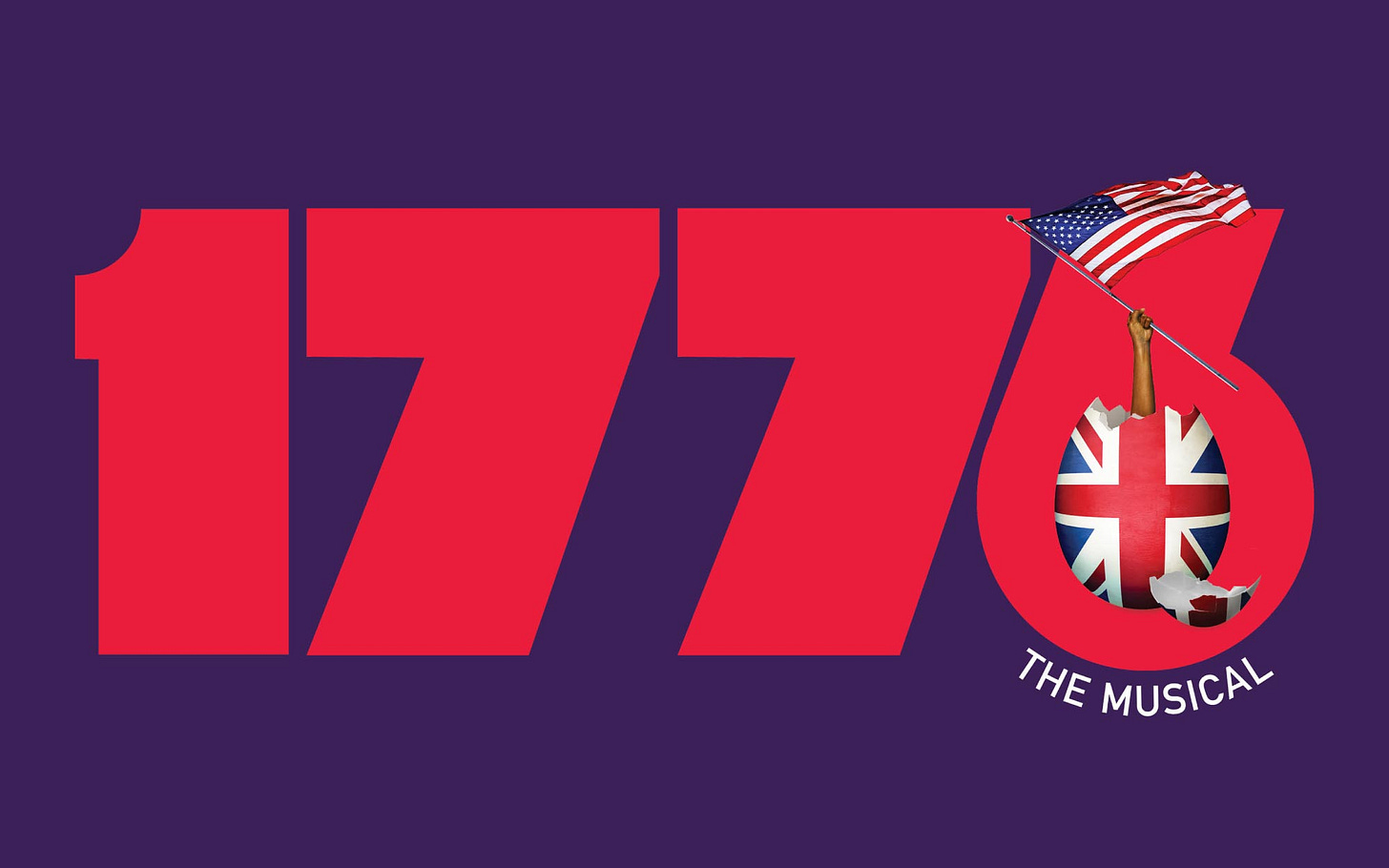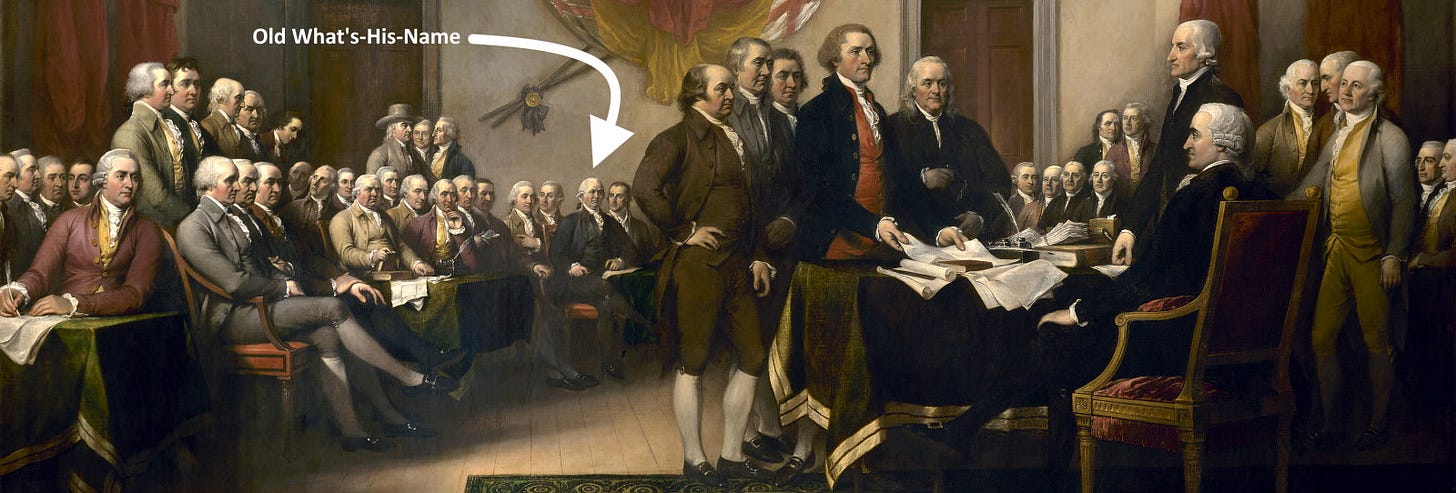1776: The Anti-Iliad of U.S. History
Starring George Washington as Anti-Agamemnon, Ben Franklin as Anti-Nestor, and a surprise Founding Father as Anti-Achilles
For those of you subscribed through my Wordlers serial on Cent Pages, welcome! This is a copy of the Mytholoversal Newsletter of essays and writing project updates that I promised you.
Today, you’re getting a mythological reivew of the movie musical 1776 (1972) and current 1776 stage revival, and a Wordlers project update.
Wordlers and Mythoversal are reader-supported publications. This month, Wordlers is offering limited edition tokens that describe the vampires and Folk shifters who live in the Wordlers world, while paid subscribers to Mythoversal received a bonus essay about how to become an ancient Greek deity.
My Take on 1776 (1972)
When I was a kid, I watched a televised film adaptation of the stage musical, 1776. The play was written in the late 1960s, the film was released in 1972, and this was some years after that.
My takeaway, at the time, was that 1776 told the story of John and Abigail Adams, a Colonial-era couple whose telepathic powers allow them to communicate over great distances. They use this power to sing interstate duets while John is off at a meeting in Philadelphia and Abigail remains at their home in Boston.
From their first duet, we learn that the Adams Family’s psychic powers come from a mysterious substance called saltpeter. While John attends a debate club he can’t get out of, it’s up to Abigail to replenish their supply of the magic dust all by herself.
Although Abigail’s quest would seem to be the far more interesting story, the movie makes the bold choice of following John through a whole bunch of talking, talking, and more talking at his meetings. John does so much talking that even the other members of his debate club tell him to sit down and shut up. It’s a recurring theme of the story. And since the other characters were so dismissive of John’s speeches, I, as an eight-year-old audience member, ignored the substance of his petition as well.
Somewhere off-screen, Abigail slays a monster and grinds its bones into dust, probably, to generate a barrelful of saltpeter. She telepathically sings a victory song back to John, who takes the good news to his debate club, and that’s how the United States declared its independence.
“Wait, the United States?” eight-year-old me asked the screen. “My country was founded from a quest for magical telepathy-granting dust? Why didn’t anyone ever tell me historical documentaries could be so awesome?”
My Take on 1776 (2022)
Recently, I watched an all-female-identifying and non-binary cast performance of the 1776 stage musical, and the story was slightly different than how I remembered it.
The long-range telepathy between John and Abigail was still included. A vital quest for saltpeter still happened off-stage. I still had a sense that Abigail was very possibly hunting dragons while we weren’t watching her. But this time, as an adult, I had enough patience to follow the substance of the debates held in the Continental Congress.
Here’s where the mythology comes in, because you knew it had to, eventually. I’ve come to the conclusion that 1776 is an inverted version of Homer’s Iliad.
Stay with me here.
The Iliad centers Achilles as a superhuman warrior above all other superhuman warriors on the Troad Plain, who must choose between kleos and nostos while engaged in an epic battle far from his home. Kleos is a kind of legacy, a level of fame that echoes down through the ages. The twist is that for Achilles, his kleos would require his early death. Nostos, on the other hand, is a homecoming from the battlefield that would allow Achilles to live out a long lifetime in obscurity. The story of the Iliad is a chain of events that forces Achilles to stop avoiding his choice and come down on one side or the other. Ultimately, Achilles chooses kleos, and as a result, the Achaeans won the war and all of Greek civilization came to exist.
1776 centers John Adams, Benjamin Franklin, Thomas Jefferson, George Washington, and a host of other Founding Fathers (and a monster-slaying Abigail Adams) who earned their kleos in an epic battle of rhetoric far from their homes. A winning argument was edited into consensus, and as a result, the United States came to exist.
But unlike in the Iliad, there’s nothing superhuman about any of these great warriors of debate. Washington, repeatedly begging for supplies, is no Agamemnon. Franklin, extolling the virtues of the turkey as a potential state bird, is no Nestor. Adams, so disliked that his speeches inspire ridicule, is no Odysseus. At one point, Franklin breaks the fourth wall to apologize that he and his fellow delegates aren’t demigods, but morally compromised men falling short of their own ideals.
The theme of legacy is repeatedly raised, to the point where we might expect one of the delegates to pull an Achilles, choosing legacy at great personal cost over a long life of obscurity. And in fact, just as in the Iliad, 1776 features a singular character who is burdened by such a choice. But it’s not until the climax of the play that we discover that the Achilles analogue of American history is old What’s-His-Name, a Pennsylvania delegate who’d been hiding in plain sight for the entire play, offering no opinions of his own up to that point.
I mean, he had a name. Of course, he had a name, along with a level of prominence that had gotten him into that roomful of Founding Fathers. I’d just never heard his name before, and ten minutes after the play ended, I’d forgotten his name all over again. I could Google him, but even if I did, I’d half-expect Google to return a 404 error. If any man ever radiated obscurity, it was old What’s-His-Name.
Every story beat in 1776 leads up to the moment when old What’s-His-Name has to choose between kleos and nostos, but unlike Achilles, old What’s-His-Name tosses kleos away like it’s a hot coal that’s burning his hands. Old What’s-His-Name wants nothing more than to fade into the background. He wants his name to be left out of the history books. He literally doesn’t care whether the United States declares independence or not, as long as he gets to go home and live out the balance of his life in obscurity.
For me, this makes 1776 the Anti-Iliad, the only one I’ve ever encountered, with an Anti-Achilles who steps forward only when forced, says his piece in as few words as possible, and chooses to cast the smallest possible shadow over history.
It also turns out that saltpeter, or potassium nitrate, is an ingredient used in the manufacture of gunpowder. Saltpeter can be made from urine. John was asking Abigail and her compatriots to collect their urine and refine it into enough saltpeter to turn the tide of the Revolutionary War, which they did. In return, Abigail requested that John have the Continental Congress enshrine women’s rights in the future U.S. Constitution, which…is still a work in progress.
--Greg R. Fishbone, Mythology Disruptor
Countdown to NIGHTfall
Every morning, a new Wordler set out on a quest for the five-letter word that can protect Wordler Village for one more day…until one of them failed.
I’m excited about this story. This little piece of it, called NIGHTfall, is a 20,000-word novella broken into 23 episodes. Each episode is inspired by a daily Wordle answer, but the story has grown into something that you don’t have to be a Wordle fan to enjoy. There are vampires, zombies, GIANTs, and aliens, but this batch of Wordle words also includes TRYST and ELOPE, so there’s also a bit of unexpected romance.
I’ll be releasing collectible tokens each day. There will be a ten-day countdown running from August 22 through August 31 followed by the story episodes running from September 1 through September 23. Content is free to read and the tokens are free to collect. You’ll get the episodes in your inbox, but you’ll have to check in every day to claim the tokens.
I’m intending this to be the start of a long-term experiment. Check Greg.Cent.co for the latest tokens and the Wordlers Page at Cryptoveral Books for updated information.
--Greg R. Fishbone, Wordler Warrior





